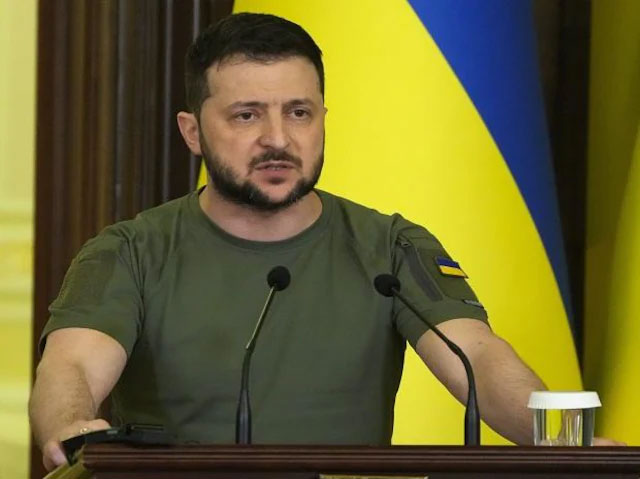Ukrainian president blames Russia for Sri Lanka crisis
July 14, 2022 11:40 am
Ukrainian President Volodymyr Zelensky blamed Russia for causing unrest in Sri Lanka as well as around the world due to the blocking of food products during the invasion of Ukraine.
One of the major tactics Russia has used in their invasion of Ukraine is the creation of an “economic shock,” Zelenskyy said, adding that several countries experiencing food and fuel shortages due to the disruption in the supply chain have benefitted Russia’s agenda.
Highlighting the crisis in Sri Lanka during a recent address at the Asian Leadership Conference in Seoul, he further said “The shocking food and fuel price hikes led to a social explosion. No one knows now how it will end.”
War in Ukraine has left an estimated 1.6 billion people in 94 countries exposed to at least one dimension of finance, food, or energy crisis, with around 1.2 billion living in “perfect-storm” countries severely vulnerable.
Sri Lanka is suffering its worst economic crisis since gaining independence in 1948, which comes on the heels of successive waves of COVID-19, threatening to undo years of development. Notably, the oil supply shortage has forced schools and government offices to close until further notice. Reduced domestic agricultural production, a lack of foreign exchange reserves, and local currency depreciation have fuelled the shortages.
Moreover, due to the ongoing conflict between Russia and Ukraine, the increase in hunger since the start of the war is only ascending. The number of severely food insecure people doubled from 135 million prior to the pandemic, to 276 million over just two years. The ripple effects of the war could push this number to 323 million.
The Group of Seven (G7) leaders during the recently held summit also discussed the impact of Russia’s war on food and energy supplies including the global economy and said the bloc is determined to support Ukraine in producing and exporting grain, oil, and other agricultural products. They called upon Russia to cease, without condition, its attacks on agricultural and transport infrastructure and enable free passage of agricultural shipping from Ukrainian ports in the Black Sea.
In a recent agreement between the Russian Federation and Ukraine, a months-long blockade of grain deliveries via the Black Sea will break, the UN Secretary-General Guterres said in a statement calling it a critical step forward in ensuring the safe and secure export of Ukrainian products.
According to the Food and Agricultural Organisation of the United Nations (FAO), 20 million tons of grain, meant for the global market, are still stuck in Ukraine’s Odessa port. Ukraine used to ship over 50 per cent of its exports from its largest Black Sea port in Odessa. But ever since the war started, a blockade by the Russian Black Sea fleet has prevented exports and imports.
With the conflict in Ukraine in its fifth month and much of the world seeing food prices soar, getting grain and fertilizer shipments moving again from two of the world’s major exporters has become a crucial task for global bodies.
Even as food prices soar internationally, experts believe that Sri Lanka’s economic crisis was set in motion by government’s mismanagement, nepotism and lack of accountability which went unchecked for decades. As the government ran out of foreign reserves, it was unable to import cooking gas and other fuels, food and medicines, causing severe shortages in the island nation.
--Agencies












